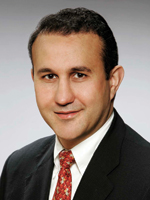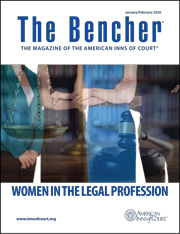Lawyers’ Duty of Candor to the Court
The Bencher—January/February 2020
By Francis G.X. Pileggi, Esquire

 Most lawyers are familiar generally with their duty of candor to the court. This short ethics column is intended as a cursory overview of some of the nuances of that obligation, with reference to a few selected court decisions that have applied the rule in different factual settings.
Most lawyers are familiar generally with their duty of candor to the court. This short ethics column is intended as a cursory overview of some of the nuances of that obligation, with reference to a few selected court decisions that have applied the rule in different factual settings.
Rule 3.3 of the Delaware Lawyers’ Rules of Professional Conduct provides that a lawyer may not make a false statement of fact or law to a tribunal or fail to correct a false statement of material fact or law previously made to the tribunal by the lawyer. See Rule 3.3(a)(1). A lawyer also is required to disclose legal authority in the controlling jurisdiction known to the lawyer to be directly adverse to the position of the client and not disclosed by opposing counsel.
Rule 3.3(a)(3) prohibits a lawyer from offering evidence that the lawyer knows to be false. The duties of candor in subparagraphs (a) and (b) apply even if compliance requires disclosure of information that is otherwise protected by Rule 1.6, which is the duty of an attorney to maintain confidential information received by the client.
By comparison, California does not limit a lawyer’s duty of confidentiality to the client by the duty of candor to the court. See California Rule of Professional Conduct 5-200; California Business and Professional Code Section 6068(e). The Delaware rule, however, expressly limits the duty of confidentiality that a lawyer owes to her client by the superseding obligation of candor that a lawyer owes to the court. Compare San Diego County Bar Association Legal Ethics Opinions 2011-1, which applied the California version of the duty of candor to the court to permit a lawyer to refuse to answer a question from the court if it required the disclosure of confidential information that came from the client.
At least in Delaware, trial courts are not often required generally to address a violation of the Rules of Professional Conduct, although Rule 3.3 is one of those rules that might attract greater attention from the court if violated. The reason for that approach, to the surprise of some readers, is that the Delaware trial courts do not view their primary rule as enforcers of the Rules of Professional Conduct—unless those violations “prejudicially disrupt judicial proceedings” or “threaten the legitimacy of judicial proceedings.” See, e.g., Crumplar v. Superior Court, 56 A.3d 1000, 1009 (Del. 2012).
Other rulings have used the threshold phrase that would trigger the court’s direct involvement as violations of the rules that “interfere with the administration of justice.” See Lendus, LLC v. Goede, C.A. 2018-0233-SG (Del. Ch. Dec. 10, 2018). See also In re McCarthy, 173 A.3d 536 (Del. 2017) (explaining that disbarment was the appropriate penalty for the intentional misconduct of an attorney who repeatedly failed to disclose altered medical records during a trial, and despite multiple opportunities for corrective action, failed to correct a client’s false testimony, among other serious errors during both pretrial proceedings and at trial). When the violation is serious enough, even if the court does not directly address it, the court can refer the matter to the Office of Disciplinary Counsel, which is an arm of the Delaware Supreme Court and which has the resources to conduct investigations and, in the appropriate case, to prosecute violations. See generally Charter Communications Operating LLC v. Optymyze LLC, C.A. No. 2018-0865-JTL (Del. Ch. Mar. 5, 2019) (observing that the Delaware Supreme Court has sole and exclusive responsibility over all matters affecting governance of the Bar).
The Goede case was a decision from the Delaware Court of Chancery in December 2018, revoking a pro hac vice admission that provides an excellent example of a measured and thoughtful approach to violations of the Rules of Professional Conduct by a trial court. For example, the court exhorts attorneys who think that other counsel have violated rules, or have done something that might warrant a request for attorneys’ fees, to “think twice, three times, four times, perhaps even more” before seeking penalties against other attorneys for allegedly inappropriate conduct.
The court emphasized in the introduction to its decision that it derives no pleasure in criticizing attorneys because judges understand the “pressures and frustrations of practice.” The court referred to members of the bench as not being above reproach, with the following quotable phrase: “none of our own eyes being timber-free…”
In addition to its discussion of Rule 3.3, the Goede opinion contains many quotable articulations of the standards of attorney conduct that are expected even if they do not rise to the level of a violation of applicable rules. For example, citing other court decisions, the court explained that it will “not condone, accept, or permit the use of profanity, acrimony, derisive jibes, or sarcasm with respect to any communication related to a matter, proceeding, writing, meeting, etc.”
Regarding Rule 3.3(a), the court also referred to the Principles of Professionalism for Delaware Lawyers, which provide at paragraph A(4) that in addition to candor to the court, professional civility requires “conduct that shows respect…for all people encountered in practice, which includes emotional self-control and the absence of scorn and superiority in words or demeanor.” The court explained that these standards also apply to those attorneys admitted pro hac vice.
Delaware courts have often revoked pro hac vice admissions when attorneys have not complied with Delaware standards. See Manning v. Vellardita, C.A. No. 6812-VCG (Del. Ch. March 28, 2012) (finding a violation of the duty of candor to the court and revoking a pro hac vice admission for not disclosing in the motion for admission pro hac vice a conflict of interest involving other parties in the case). In Sequoia Presidential Yacht Group LLC v. FE Partners LLC, C.A. No. 8270- VCG (Del. Ch. July 5, 2013), the Delaware Court of Chancery referred to the appropriate agency in New York the conduct of an attorney from New York admitted pro hac vice based on sub-par conduct by that New York lawyer. The court explained how hesitant it was to take the action it did. The following “money quote” deserves mention:
No state benefits more from admissions to its Bar pro hac vice than Delaware, and no judges benefit more from that system of admissions than the members of this Court. Having said that, the opportunity to practice before this Bar, even on a temporary basis, is a privilege. Like Delaware attorneys, attorneys from other states are expected to abide by high standards of professional conduct. Nonetheless, for the following reasons I am content to stay my decision here. This Court’s jurisdiction to police attorney behavior only extends to conduct which may prejudice the “fair and efficient administration of justice.” (Footnotes omitted.)
In the most egregious of situations, a court may dismiss a case due to misrepresentations intentionally made to the court in an attempt to have the court make a ruling based on those false facts. Such was the result in Parfi Holding AB v. Mirror Image Internet, Inc., 2008 WL 4110698 (Del. Ch. Sept. 4, 2008), in which the court provided a magnum opus on the importance of being earnest. Some wags might suggest that such truisms need not be explained in an opinion, but this decision provides a high watermark for the type of misrepresentations to the court that have drastic consequences.
The court explained the reasoning that supported its conclusion by stating: “When a party knowingly misleads a court of equity in order to secure an unfair tactical advantage, it should forfeit its right to equity’s aide. Otherwise, sharp practice will be rewarded, and the tradition of civility and candor that has characterized litigation in this court will be threatened.”
The court provided copious citations to extensive authority for penalizing a breach of the duty of candor to the court, including dismissal, in order to ensure, based on its inherent authority to police the litigation process, that acts that undermine the integrity of the judicial process are penalized.
The specific misrepresentation to the court in the Parfi case involved an initial stay of the Chancery proceedings based on the understanding that the parties would proceed to arbitration in Sweden. At a routine status conference in the Chancery case, the court inquired about the pendency of the arbitration in Sweden. It became apparent to the court during that conference that the primary plaintiff was attempting to “game the system” and avoid proceeding to arbitration. The court found that there was a material misrepresentation to the court about the inability to proceed with the Swedish arbitration, in an attempt to seek a modification of the stay order in Chancery. The court allowed discovery into whether the plaintiffs engaged in sanctionable delay and made misrepresentations to the court. The result of discovery confirmed evidence of both.
In sum, many instances of failure to comply with Rule 3.3 may not rise to the level of severity requiring dismissal of the case, and there may be some instances where there is less than abundant evidence or clarity about unambiguous facts supporting a lack of candor, but this short overview of selected cases provides several examples of boundaries that were crossed—resulting in dire consequences.
Francis G.X. Pileggi, Esquire, is a litigation partner and vice chair of the Commercial Litigation Practice Group at Eckert Seamans Cherin & Mellott, LLC.He comments on key corporate and commercial decisions and legal ethics topics at www.delawarelitigation.com.